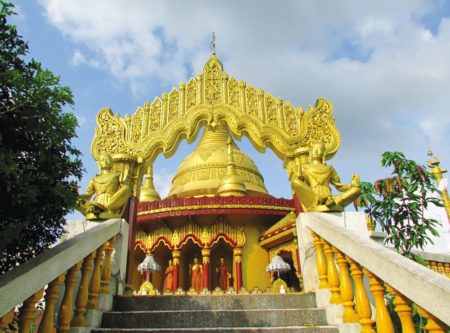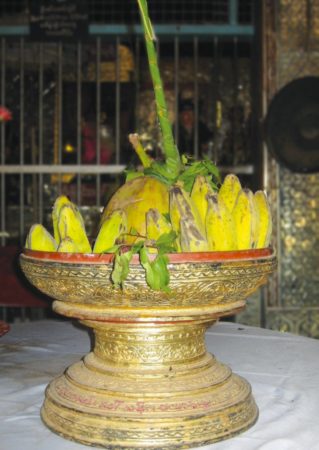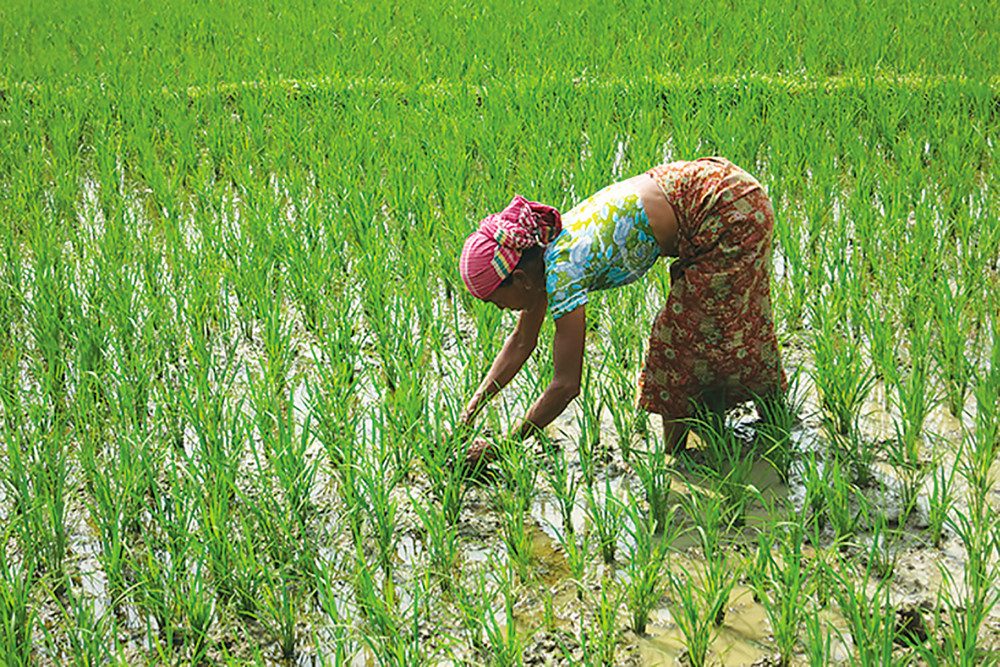And he will destroy on this mountain the shroud that is cast over all peoples, the sheet that is spread over all nations; he will swallow up death forever.
Isaiah 25:7,8a (NRSV)
“Squish.” Soft rich mud oozes between Sanda’s toes as she skillfully grasps a rice stalk from the bundle in her hand and sets the tender shoot firmly in the saturated soil. It joins the growing pattern of thousands of rice stalks she has already transplanted that morning. In the meantime, the sloshing of the murky water and Sanda’s rhythmic movements bring comfort to baby Hayma who sleeps soundly against her mother’s warm back.
“Swish.” The colorful htamain (sarong) Sanda wears catches both the breeze and Yahu’s gaze. Her young husband looks up for a moment, scans the bright green fields, and rests momentarily from cultivating the field with his father-in-law’s buffalo-drawn plow. He smiles at his family.
“Ah! Hee-hee!” The laughter of Sanda’s relatives fills the air; everyone helps with the crop that is foundational to their food and income. Like many others of her people group, the Bamar, her parents migrated to the rich flood plains and hill country near the Bay of Bengal to escape the turmoil in their home of Myanmar. But Bangladesh has its own problems…

“Gong.” A distant bell rings. The gold-colored roofs of many Buddhist temples are easily visible beyond the trees that surround the family’s fields and small bamboo home. While neither clan nor lineage are of significance to the Bamar, the village temples and monastery are central to each villager’s identity and cultural life. Sanda’s husband, brothers and father have all attended the monastic school, worn the yellow robe, and been taught to practice charity, morality and meditation. The Buddhist shrine in their home is well kept with frequent offerings. Her family seeks to follow the Five Precepts of Buddhism and each year participates in the solemn festivals at the monastery.
“Slosh.” Sanda adjusts her posture to reach for another bundle of rice stalks. While Hayma sleeps peacefully, however, Sanda’s thoughts are far from tranquil. She worries they have offended a nat: This morning she awoke to notice a large bruise on her left arm that most certainly was not there when she lay down to sleep on the floor last night.

The nats, dozens of mostly malevolent spirits who may resemble humans, possess animals, or take the form of trees and rocks, must be appeased to protect people from other evil powers. For as long as they can remember, Sanda and Yahu have tried to calm the nats with food and other offerings. Both inside and outside their home, Sanda and Yahu have dedicated nat altars. They regularly give offerings to the village’s patron nat under the Bo tree outside the village and always make propitiation to the nats before making important decisions. They have paid the nat-kadaw for his shamanistic services at the lively nat festivals. In spite of this, calamities still overtake the family. Last month Sanda’s father fell and painfully injured his wrist; two weeks ago someone stole Yahu’s bicycle; and this week their home’s thatched roof caught fire. Those nats are such a mischievous nuisance!
“Silence.” Sanda abruptly pauses from her labor, pondering: “Buddha tells me that suffering comes from bad karma earned in my past lives and that karma cannot improve until my next life. But I also know that suffering is caused by the nats, and Yahu and I are daily preoccupied with satisfying them. Are life’s difficulties from my karma or the nats? Or is there another answer?”
“Rustle.” Hayma awakens and wriggles at the cessation of sound and motion. Sanda’s probing thoughts end almost as quickly as they had begun. Back to the rice.
The Bamar are originally from the area of western China known as Tibet. Today, about two-thirds of all Myanmar are Bamar people. About 82,000 Bamar, like Sanda, live in Bangladesh, while smaller numbers live in other nearby countries.
Pray For the Unreached Among the Bamar People
- Lord, you are the way, the truth and the life. Please grant Bamar people insight that leads them to see themselves, other people and the world around them in a way that draws them toward relationship with you. May Bamar thirst for the source of truth and develop a sense of humility and vulnerability in their hearts in preparation for your Good News.
- Lord of the harvest, please send out more workers who are equipped to reach out to the Buddhist Bamar and share the message of Jesus Christ their only Savior.
- Lord of all the nations, would you please open doors of opportunity and relationships for the sharing of the gospel with Bamar people wherever they live.
- Our Intercessor, please lay on the hearts of your children to pray and intercede regularly for the Buddhist Bamar people.
